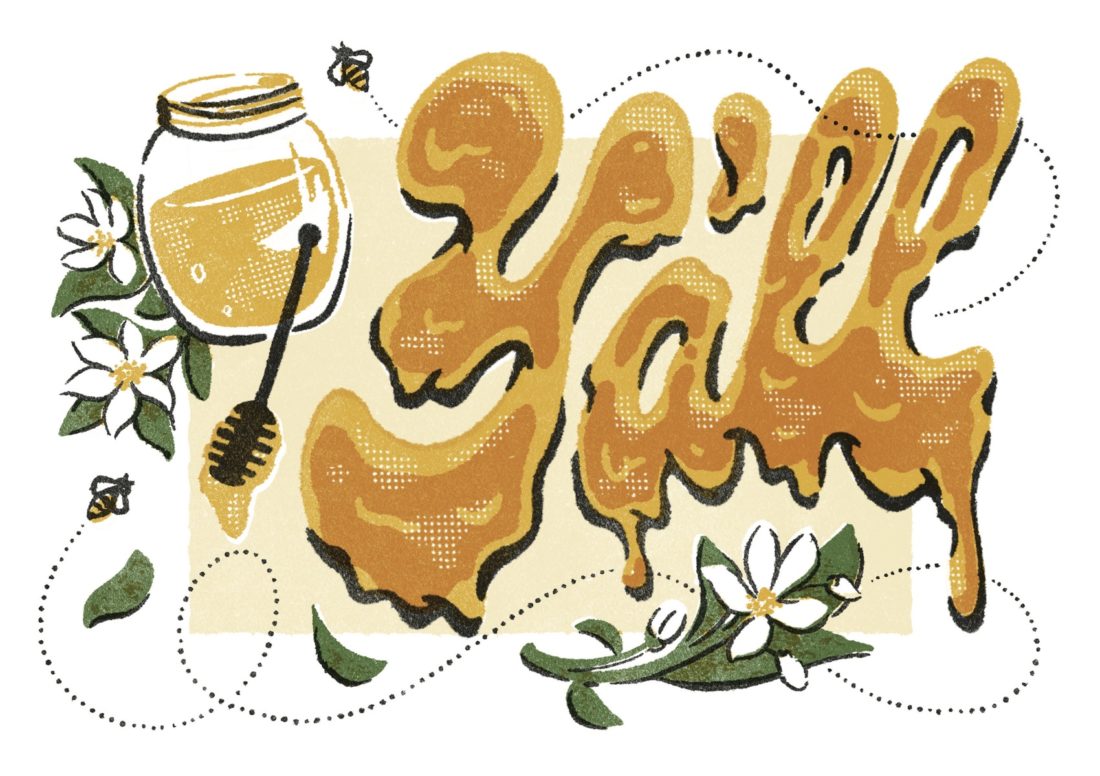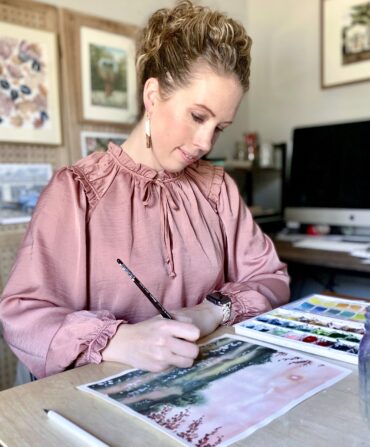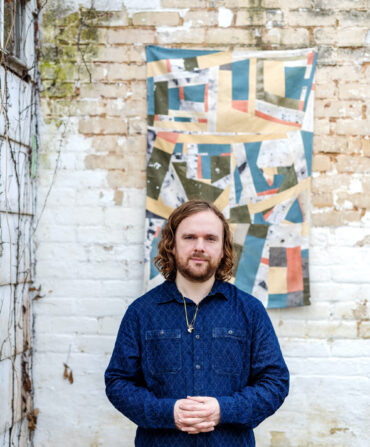Even if my accent slightly drifted over my many years away in California, New York, New Jersey, and Italy, I always said “y’all.” Now, at home in North Carolina, it no longer provokes a smile. And once again, the cake is covered with icing, not frosting; there’s dressing with the turkey, not stuffing; and I simply make slaw, not coleslaw. “Caramel” gets its second a back, and I don’t hear the grating “PEE-can” for “puh-KAHN.” When the lemon pie comes to the table, I can ask, “What do this pie and my hand have in common?” And I know my daughter will call out “Mah rang!” Though I won’t take up “that there,” or “this here,” or “might could,” or even “bless your heart,” I like hearing them.
I’ve always loved the Southern accents, each of them. Now that I’m living back in the South, my own Georgia pitch and rhythm become more pronounced as I recall the useful “fixin’ to,” “yonder,” and “reckon.” “Fixin’ to” adds a dynamic that “about to” doesn’t have. “Yonder” just sounds farther than “over there,” and “reckon” adds a certain summing-up note of judgment that “think” doesn’t give. “Y’all” has a particular talent. While “you” acts as an ambiguous one or many, “y’all” is plural and an excellent clarifier. If I invite “you” to dinner, you might not know I mean to include the whole clan. “Y’all come to dinner” is precise in meaning. I even like “all y’all,” the ultimate inclusive “you.”
In my early peregrinations, responses to my accent varied. We girls going up to Princeton parties from the women’s colleges in Virginia were surprised at the power we wielded. On those snowy weekends, the blind dates we met simply melted. They must have been dreaming of humid nights on some bayou, orange blossoms on the breeze, bees burrowing into the gardenias. When the trips became frequent, my grandfather forbade me to go. He didn’t want me “to marry some Yankee two-by-four, most common of all pieces of wood.” Later, in accentless California, I felt exotic, but a few laid-back classmates at first looked at me as though I came from three generations of intermarriage with second cousins. Moving to New York for my husband’s job, I was taken aback when his boss greeted me warmly, then slightly into the conversation, asked with a smile, “Well, Miss Peaches, will you be enrolling in speech therapy?” I’d noted his harsh nasal accent. “Why, no,” I answered in a dripping cane syrup drawl. “Will you?”
Outside the South, we know we’re often typecast as racist or as dumb as a box of rocks the minute we open our mouths. Those stereotyping boors are unaware, though, that we’re doing some fancy judging too. I recall Lewis Grizzard, the late Atlanta humorist, brutally observing, “The most effective form of birth control known to man is a Bronx accent.” Recently I came across an article written by a woman in Charlotte who worried about her three-year-old acquiring a Southern accent. In the comments section, one responder said that he hadn’t fit in up in Michigan because people told him he sounded terrible. He kicked back. “I told them they sound like a dying possum in a trash can.” My parents had one New York friend who came to visit. At eight, I recall making fun of him in the kitchen because although my mother called him refined, he said “duwog” instead of “dawg” and “ideers” for “ideas,” and he pronounced Miami “Mee-ah-me.” I got switched on the legs for that.
Mostly, I’ve loved the deeply personal benefits of a Southern accent. I thrill to the sound of a modulated voice with more soft notes than a harp. Etymologically, the word accent traces back to the Latin word for song. How many instant connections have I found? Even a sense of community in far-flung places. I hear at the next table at a trattoria in Rome the lilt and sass of a Southern accent drifting my way. Before the waiter pours the wine, it’s a “Hey” and a “Where are you from?” and before long I know where her mother grew up, and what cousin went to Emory, and that Daddy was a doctor in Gainesville. When I’m in the dentist’s chair in San Francisco, the hygienist says, “Do I detect a Southern accent? I’m from Greenville, South Carolina, originally.” She didn’t sound like it before but immediately lapses into her real voice. (Code-switching is common in displaced Southerners: Cover up your accent with a neutral voice.) She gouges my gums with her pointy instruments, regaling me with stories of crazy relatives. “You need to flawss more,” she concludes. I relish these bonds. That a cadence evokes a link. That the dropped g or r (“goin’,” “ov-ah”), or a shifted emphasis (“the-ATER,” “BE-hind,” “THANKS-giving”), or run-together words—“atall” is one word—all signal home.
Accents are fading. Influxes of people from elsewhere, media rigidity about bland voices, the fear of being subjected to stereotype—all of this erodes regional differences. People are overly sensitive to the possibility of a Southern accent impacting their careers. Wait. Anyone ever think Molly Ivins, Truman Capote, or Tom Wolfe a bit dim? Dolly Parton or Morgan Freeman? Sam Ervin, the famous “law-yah” in the Watergate hearings? If so, you were shortly eviscerated by his rapier-sharp questioning. And the recent presidents Johnson, Carter, Clinton, George W. Bush? Their panoply of local accents didn’t stop them. Won’t it be sad when we all sound as though we’re reading the evening news? “Say ‘riv-ah,’” I tell my grandson, but he won’t. His teachers and friends in this Triangle area speak no Southern, and most probably he never will either. There’s nothing to do about this. I’m happy that the South is vast, with deeply defined regions and pockets and crannies and mountaintops. We’ll hold on to our heritage as far as we can see.
In the 1990s, when I became a part-time resident of Italy and was working on my memoir Under the Tuscan Sun, I was learning Italian and began to hear the differences between the Tuscans and the Venetians, the Neapolitans and the Sardinians. I was delighted to be acquiring an accent in a language I barely could speak. It meant I was from Cortona, my adopted hometown. I love the clackety sounds in Venice, the lightning speed and elisions of Sicily, and the posh frenchified sounds of the rich Piedmont region. I was gradually loosened from my belief that if the angels came down to earth, they spoke Southern.
I fell in love with accents, all kinds. They belong to a place and time. And thereby the place belongs to the speaker of that accent. My husband’s Minnesota relatives sound as though they have snowflakes in their words. Flinty fields appear in the Vermonters’ voices, and old ballad rhythms linger in the tumbling Appalachian waterfall of vowels. In “I Hear America Singing,” Walt Whitman wrote: “Each singing what belongs to him or her and to none else.” (And bless his heart—there, I said it—for including “her” back in the 1860s.) I like what belongs to me and mine, but why not celebrate differences? You say “motorcycle,” and I say “motah-sickle.” Let’s go for a ride.
More from Frances Mayes:








